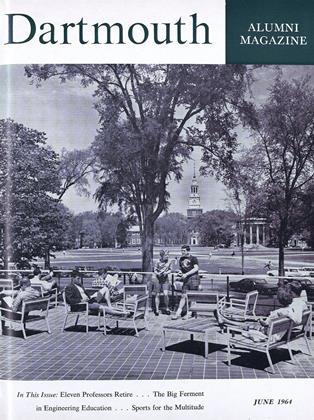By Russell M. Mead Jr. '56. New York: E.P.Dutton and Co., 1964. 186 pp. $3.50.
Educators of our day are devoting much time and energy to research on reading for they realize the necessity for developing classroom reading programs which can be adapted to the abilities of each student. In many instances, finding a book of suitable vocabulary difficulty and interest level can be more beneficial for a particular student than merely assigning or suggesting a socalled classic to the entire class.
In writing If a Heart Rings - Answer, Russell Mead has not attempted to create a novel of classic proportions. But he has succeeded in writing a story about a high school romance which can provide sound reading and meaningful entertainment for most high school students, and amusing nostalgia for the young at heart.
Mr. Mead was very .active during his high school years at South Denver High School. He now teaches English at Concord Academy in Massachusetts. Both these biographical facts contribute to the makeup of his book which deals with one Ronnie Martin's senior year in a Midwestern high school.
As he narrates the story of his romantic and extracurricular trials and triumphs, Ronnie employs teenage vocabulary and figures of speech ("stomped down the stairs like volcanoes with indigestion") which to anyone familiar with high schoolers are the proper mixture of corny wit, sincere feelings, and emphatic colloquialisms. Though the jargon is too thick in places, probably because Ronnie is, among other things, a trombonist in a dance combo, the vocabulary content is comprised of enough appropriately-included medium-difficulty words to provide a beneficial challenge to the average high school student.
The episodes incorporated by the author into his main character's narrative are realistic and involving. Mr. Mead handles with good taste what some current authors can only present crudely. The warmth and growth of a teenage relationship and its influence on the usual senior year activities in school and home are captured in the wholesome, noticing mind of Ronnie Martin as he thinks back over his first date, his close second in an election, his band's engagements, his acceptance as a "steady" and his decision to go to Dartmouth. For the younger reader, the book can be a pleasant change-of-pace; for the older reader - parent or teacher - it can be an amusing description of times present or a recapturing of times past.
Reviewer Jaeger teaches Englishat Hanover High School
 View Full Issue
View Full Issue
More From This Issue
-
 Feature
FeatureThe Big Ferment in Engineering Education
June 1964 By DAVID ALLISON, -
 Feature
FeatureA Teacher's Real Reward
June 1964 -
 Feature
FeatureSports for the Multitude
June 1964 By LARRY GEIGER '66 -
 Article
ArticleTHE UNDERGRADUATE CHAIR
June 1964 By DAVE BOLDT '63 -
 Class Notes
Class Notes1920
June 1964 By CHARLES F. MCGOUGHRAN, JHON S. MAYER -
 Class Notes
Class Notes1930
June 1964 By WALLACE BLAKEY, ARTHUR M. BROWNING
RICHARD G. JAEGER '59
Books
-
 Books
BooksFACULTY PUBLICATIONS
May 1919 -
 Books
BooksA SON'S PORTRAIT OF FRANCIS E. CLARK
February, 1931 By Charles D. Adams -
 Books
BooksUNOFFICIAL ART IN THE SOVIET UNION.
MARCH 1968 By GEORGE KALBOUSS -
 Books
BooksTHE WAY OF THE GREEKS
APRIL 1930 By J. B. Stearns -
 Books
BooksTHE SEA WITCH
JULY 1968 By JOHN HURD '21 -
 Books
BooksDeviationist
JUNE 1966 By JOHN PARKE '39



